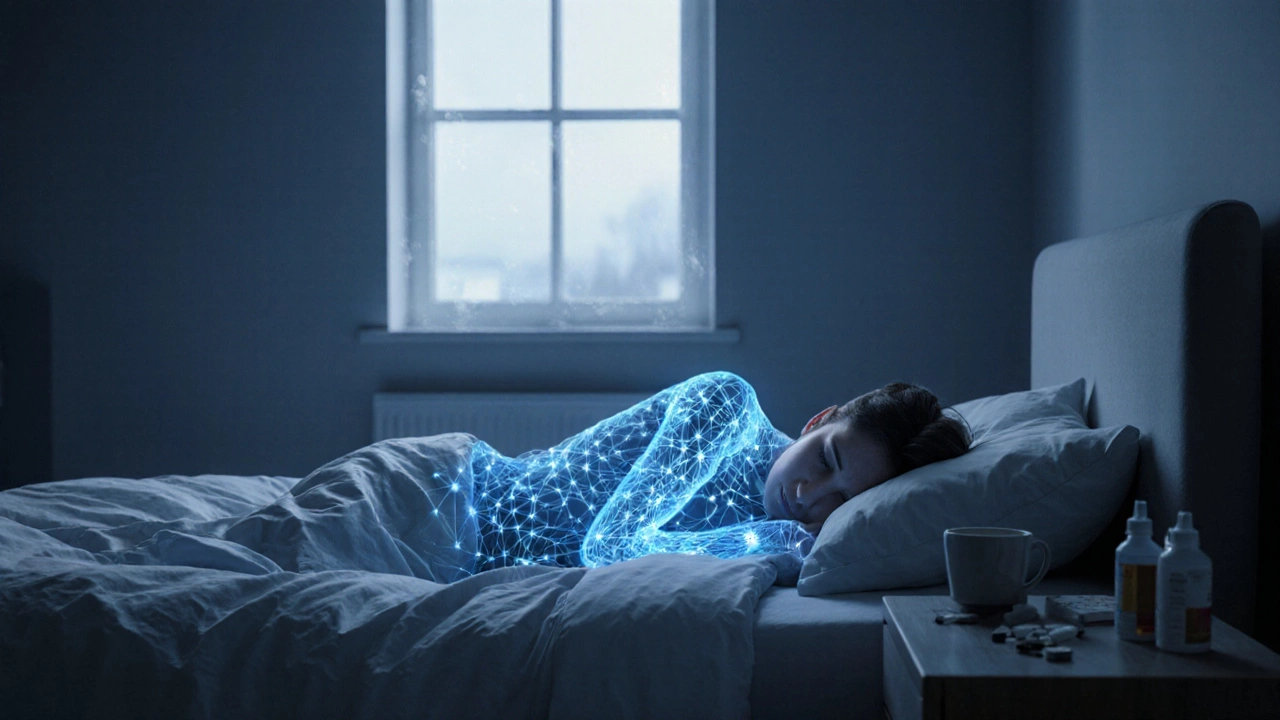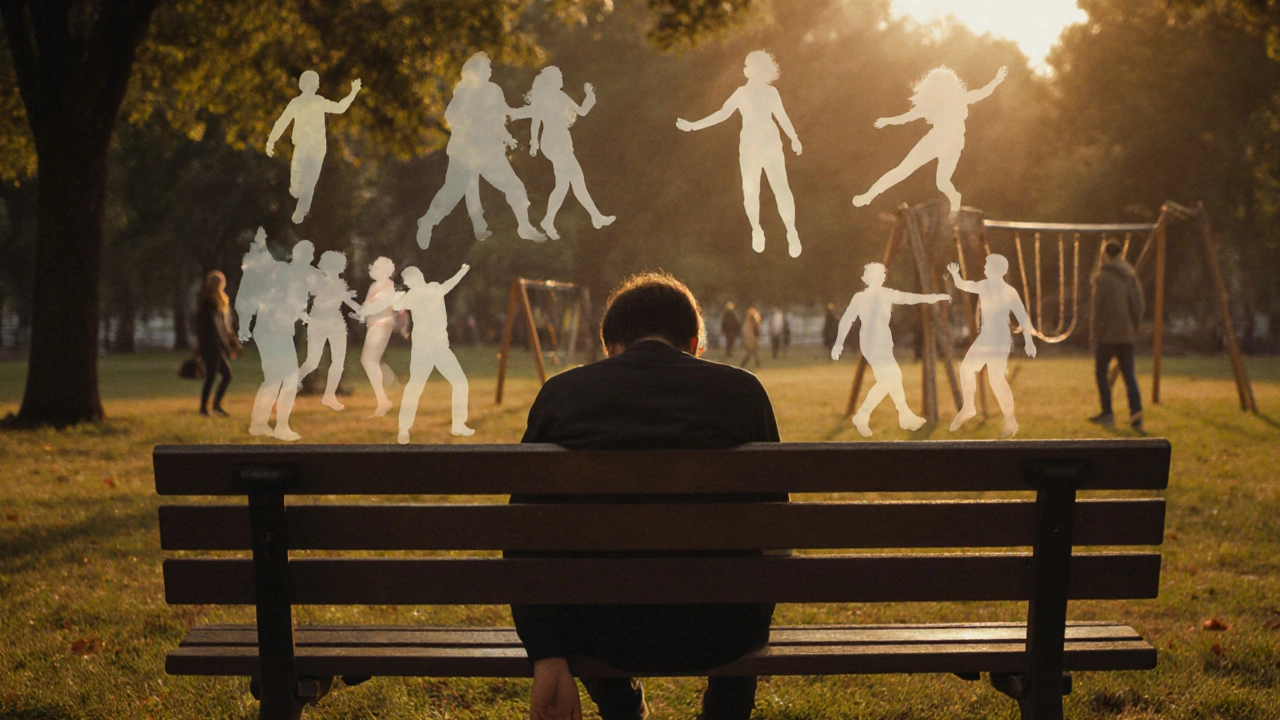 Nov, 18 2025
Nov, 18 2025
Chronic Pain Impact Assessment
How chronic pain impacts your life
This assessment helps identify areas where chronic pain affects your physical, emotional, and social well-being. It takes just 3 minutes and provides personalized insights.
Your Assessment
When pain doesn’t go away, it doesn’t just stick around-it rewires you. Not just your body, but your mind, your relationships, your sense of self. Constant pain isn’t a symptom you can shrug off. It’s a silent thief. It steals sleep, steals joy, steals the ability to be present in your own life. And most people don’t talk about it until they’re drowning in it.
The Body Starts to Believe the Pain Is Normal
Your nervous system isn’t designed to scream forever. But when pain lasts more than three months, your nerves start to change. They become hypersensitive. Even light touches-like clothes brushing your skin or a breeze-can feel sharp. This isn’t weakness. It’s biology. The brain keeps sending danger signals even when there’s no injury left to heal. It’s like a smoke alarm that won’t stop beeping because it’s stuck on ‘on’.
People with chronic pain often describe it as a constant hum, like a car engine idling in the background of their life. Some feel it as a deep ache. Others as electric shocks or burning. The location changes. Sometimes it moves. But the feeling? It never leaves. And over time, your body stops distinguishing between real threats and false alarms. You start moving less, not because you’re lazy, but because your nervous system is screaming danger every time you try.
It Changes How You Think
Chronic pain doesn’t just hurt. It clouds your thinking. Memory gets fuzzy. Concentration vanishes. You forget where you put your keys, miss appointments, struggle to follow conversations. This isn’t aging. It’s your brain using up all its energy just to cope with pain signals.
Studies show people with long-term pain have reduced gray matter in areas linked to decision-making and emotional control. That’s not a metaphor. It’s measurable. Your brain literally shrinks in places that help you stay calm, plan ahead, or resist impulses. That’s why so many people with chronic pain say they feel like they’re losing themselves. They’re not imagining it.
Decision fatigue hits hard. Choosing what to eat, what to wear, whether to go out-it all feels exhausting. Why? Because every choice requires energy your brain is using just to survive the pain. You start saying yes to things you don’t want to, just to avoid the guilt of saying no. Or you say no to everything, because saying yes feels like too much.
The Emotional Weight Is Heavier Than the Pain Itself
Most people expect chronic pain to cause sadness. But what they don’t talk about is the anger. The guilt. The shame. The quiet terror that you’ll never feel normal again.
You feel guilty for being a burden. You’re tired of hearing, ‘But you look fine.’ You start hiding your pain-smiling through it, pretending you’re okay, canceling plans last minute because you can’t get out of bed. Over time, you stop inviting people over. You stop posting photos. You stop talking about it, even to people who care.
Depression doesn’t always come with crying. Sometimes it comes as numbness. As apathy. As a flat, gray feeling that nothing matters anymore. Anxiety isn’t just about worrying-it’s about expecting the next flare-up, the next bad day, the next time someone says, ‘Maybe it’s all in your head.’
One woman in Auckland told me she stopped going to her daughter’s school plays because she couldn’t sit still for an hour. She didn’t want her child to see her wince. That’s the real cost: losing moments you can’t get back.

Your Relationships Start to Fray
Chronic pain doesn’t just hurt you. It hurts everyone around you.
Partners feel helpless. Friends stop inviting you out because you always say no. Family members get frustrated when you don’t ‘just push through.’ Some relationships break because the pain becomes the only thing you talk about. Others break because you never talk about it at all.
Work suffers. You miss days. You slow down. You stop taking on projects. Colleagues assume you’re not trying. Managers wonder why you’re not ‘performing.’ You’re not lazy. You’re fighting a war no one else can see.
And then there’s the loneliness. Not just being alone-but feeling unseen. People don’t know how to respond. They say, ‘I’m sorry,’ then change the subject. They offer advice: ‘Have you tried yoga?’ ‘Maybe you need more sleep.’ They don’t realize you’ve tried everything. And they still don’t get it.
Your Identity Starts to Dissolve
Who are you when you can’t do the things that defined you?
Were you the person who hiked every weekend? Now you can’t walk to the mailbox without resting. Were you the one who cooked Sunday dinners? Now you can’t stand for more than ten minutes. Were you the life of the party? Now you cancel plans because you’re too tired to smile.
Chronic pain doesn’t just take your mobility. It takes your story. You stop saying, ‘I’m a runner.’ You start saying, ‘I’m the one with the pain.’ That shift is quiet. It happens slowly. But once it’s in place, it’s hard to undo.
Some people rebuild. They find new ways to be themselves-painting instead of hiking, writing instead of dancing. But many never do. They just become shadows of who they were.

It Doesn’t Just Affect You-It Affects Your Future
Chronic pain doesn’t stop at your door. It follows you into every decision.
Will you take that job if it means sitting at a desk all day? Will you move closer to family if it means leaving your support network? Will you have kids if you’re not sure you’ll be able to care for them? These aren’t abstract questions. They’re daily calculations.
Financial stress piles on. Medications cost money. Physiotherapy adds up. Travel is harder. You can’t always work full-time. Insurance claims get denied. You start choosing between pain relief and groceries.
And then there’s the fear of the future. Will this get worse? Will I end up in a wheelchair? Will I lose my independence? Will I be a burden forever? These aren’t dramatic thoughts. They’re quiet, persistent whispers that never stop.
There’s Hope, But It’s Not What You Think
Healing chronic pain isn’t about making it disappear. It’s about learning to live with it without letting it define you.
Some find relief with nerve blocks, physical therapy, or low-dose medications. Others find it in mindfulness, pacing, or cognitive behavioral therapy. Some use gentle movement like tai chi or swimming. No single solution works for everyone. But what works for most is learning to listen-to your body, not just your fear.
Support groups help. Talking to others who get it-really get it-changes everything. You stop feeling broken. You start feeling human.
And sometimes, healing isn’t about less pain. It’s about more life. Finding joy in small moments. A warm cup of tea. A laugh with a friend. The sun on your face. Those things still exist. Even when the pain doesn’t go away.
You’re not broken. You’re not weak. You’re not failing. You’re surviving something most people will never understand. And that takes more strength than any of them know.
Can chronic pain cause depression?
Yes. Chronic pain and depression are deeply linked. The constant stress on your nervous system affects brain chemicals like serotonin and dopamine, which regulate mood. Studies show up to 80% of people with long-term pain also experience clinical depression. It’s not just sadness-it’s a biological response to ongoing suffering.
Is chronic pain all in my head?
No. Chronic pain is very real, even if doctors can’t see it on an X-ray or MRI. The brain changes physically when pain lasts too long. Nerves become overactive. Brain regions shrink. This isn’t imagination-it’s neuroplasticity. Your brain is adapting to survive, not pretending.
Why does pain get worse when I’m stressed?
Stress triggers your body’s fight-or-flight response, which increases inflammation and tightens muscles. That makes pain signals stronger. Your nervous system is already on high alert. Stress pushes it over the edge. It’s not psychological-it’s physiological.
Can exercise help with constant pain?
Yes-if it’s gentle and consistent. High-intensity workouts can make pain worse, but low-impact movement like walking, swimming, or yoga helps retrain your nervous system. Movement signals safety to your brain. Over time, this can reduce pain sensitivity. Start slow. Even five minutes a day counts.
What’s the best way to talk to my doctor about chronic pain?
Be specific. Don’t say ‘it hurts.’ Say, ‘I have a constant burning ache in my lower back that wakes me up at 3 a.m. and makes it hard to stand for more than 10 minutes.’ Bring a pain diary-note intensity, triggers, and how it affects your day. Doctors respond to facts, not feelings. And if they dismiss you, find someone who specializes in chronic pain management.
Will I ever feel like myself again?
You may not feel exactly like you did before-but you can still have a full, meaningful life. Healing isn’t about erasing pain. It’s about rebuilding around it. Many people find new passions, deeper relationships, and a quieter kind of strength they never knew they had. It takes time. It takes support. But it’s possible.
If you’re living with constant pain, you’re not alone. And you’re not broken. You’re someone who’s been through something few understand-but that doesn’t mean you have to go through it alone.
